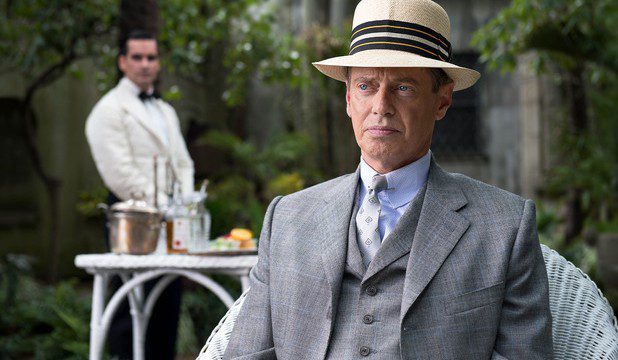Flashbacks are risky. More often than not they’re troublesome digressions from the main story, but sometimes they can be genuinely illuminating and offer us insights into these characters that previously hadn’t occurred to us (The Leftovers did this last week, with “The Garveys at Their Best”). So when I saw that the episode description for “Golden Days for Boys and Girls” included “Nucky recalls his A.C. roots,” I wasn’t too thrilled. The problem with Boardwalk Empire‘s flashbacks is that we’re five seasons in, and the regression to Nucky’s past doesn’t tell us anything we didn’t already know. Which is a shame, because for the most part “Golden Days” is quite good.
Boardwalk has never been the subtlest show when it comes to visual metaphor (think of Nucky’s dirty footprints a few seasons ago), so it should come as no surprise that “Golden Days” opens with a young Nucky in 1884, fully submerged in water, literally grasping for gold. The flashbacks continue throughout the episode, and near the end we see Nucky attack another kid, shouting “Play fair!” The irony is not lost on anyone.
Not to belabor the point, but we already know this about Nucky. He’s ambitious, he’s a striver, yada yada yada. That beign the case, the flashbacks serve little purpose (although maybe Boardwalk just wanted to show off its frankly amazing production design).
“Golden Days” is a fitting way to begin Boardwalk‘s final season. It’s 1931 now, and things have changed. Chalky White is in prison for an as-yet-unspecified crime; Meyer Lansky is seemingly spying on Nucky in Cuba; and Lucky Luciano arranges the assassination of Joe Masseria, which is okay because I think we’ve all gotten tired of Masseria’s Chef Boyardee way of speaking. It’s great to see Luciano given more to do this season – he was a virtual nonentity last year – but it was still disappointing to go a whole hour with no Eli, Dr. Narcisse, or Nelson Van Alden/George Mueller. (Troublingly, Nucky and Meyer mention having last seen each other at Arnold Rothstein’s funeral, which may be historically accurate [Rothstein died in 1928], but is still a bummer because Michael Stuhlbarg was so good as Rothstein.)
To me, the most impressive aspect of “Golden Days” was how easily this show embraces its new locations. I’m speaking mainly of Chalky’s time on the chain gang; these scenes boasted a color palette that looked as though it was listed from another show. Compare that foggy, desolate forest to 1931 Havana or 1884 Atlantic City. It’s hard to believe that such disparate locales could even exist on the same planet, let alone the same show. But Boardwalk excels at making the new seem familiar, probably because the characters always seem to know exactly where they’re going. The one exception to this in “Golden Days” is in Chalky’s panicked escape from the chain gang, which might be why those scenes are shot like a damn horror film.
The fact is, Boardwalk Empire is never going to be high up in HBO’s pantheon, with vaunted programs like Deadwood, The Sopranos, Game of Thrones, Oz, and The Wire. Boardwalk is too slow, it has too many characters – these are the most common complaints. I’d have to disagree; I think the measured pace and sprawling cast of the show make it one of the most unique on the air, and I’m damn sure going to miss it when it’s gone.

